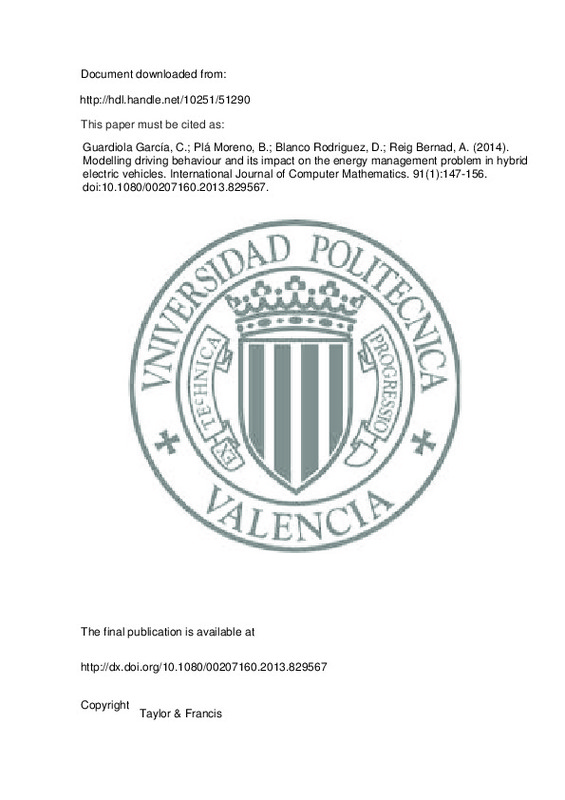Ericsson, E. (2001). Independent driving pattern factors and their influence on fuel-use and exhaust emission factors. Transportation Research Part D: Transport and Environment, 6(5), 325-345. doi:10.1016/s1361-9209(01)00003-7
Q. Gong, P. Tulpule, V. Marano, S. Midlam-Mohler, and G. Rizzoni,The role of ITS in PHEV performance improvement, 2011 American Control Conference, June–July, San Francisco, CA, 2011, pp. 2119–2124.
C. Guardiola, B. Pla, S. Onori, and G. Rizzoni,A new approach to optimally tune the control strategy for hybrid vehicles applications, IFAC Workshop on Engine and Powertrain Control, Simulation and Modeling E-COSM’12, October, Rueil-Malmaison, France, 2012.
[+]
Ericsson, E. (2001). Independent driving pattern factors and their influence on fuel-use and exhaust emission factors. Transportation Research Part D: Transport and Environment, 6(5), 325-345. doi:10.1016/s1361-9209(01)00003-7
Q. Gong, P. Tulpule, V. Marano, S. Midlam-Mohler, and G. Rizzoni,The role of ITS in PHEV performance improvement, 2011 American Control Conference, June–July, San Francisco, CA, 2011, pp. 2119–2124.
C. Guardiola, B. Pla, S. Onori, and G. Rizzoni,A new approach to optimally tune the control strategy for hybrid vehicles applications, IFAC Workshop on Engine and Powertrain Control, Simulation and Modeling E-COSM’12, October, Rueil-Malmaison, France, 2012.
Johannesson, L., Asbogard, M., & Egardt, B. (2007). Assessing the Potential of Predictive Control for Hybrid Vehicle Powertrains Using Stochastic Dynamic Programming. IEEE Transactions on Intelligent Transportation Systems, 8(1), 71-83. doi:10.1109/tits.2006.884887
Liu, S., & Yao, B. (2008). Coordinate Control of Energy Saving Programmable Valves. IEEE Transactions on Control Systems Technology, 16(1), 34-45. doi:10.1109/tcst.2007.903073
Paganelli, G. (2001). General supervisory control policy for the energy optimization of charge-sustaining hybrid electric vehicles. JSAE Review, 22(4), 511-518. doi:10.1016/s0389-4304(01)00138-2
Rizzoni, G., Guzzella, L., & Baumann, B. M. (1999). Unified modeling of hybrid electric vehicle drivetrains. IEEE/ASME Transactions on Mechatronics, 4(3), 246-257. doi:10.1109/3516.789683
Control of hybrid electric vehicles. (2007). IEEE Control Systems, 27(2), 60-70. doi:10.1109/mcs.2007.338280
L. Serrao, S. Onori, and G. Rizzoni,ECMS as realization of Pontryagin's minimum principle for HEV control, 2009 American Control Conference, June, Saint Louis, MO, 2009, pp. 3964–3969.
Serrao, L., Onori, S., & Rizzoni, G. (2011). A Comparative Analysis of Energy Management Strategies for Hybrid Electric Vehicles. Journal of Dynamic Systems, Measurement, and Control, 133(3). doi:10.1115/1.4003267
Stockar, S., Marano, V., Canova, M., Rizzoni, G., & Guzzella, L. (2011). Energy-Optimal Control of Plug-in Hybrid Electric Vehicles for Real-World Driving Cycles. IEEE Transactions on Vehicular Technology, 60(7), 2949-2962. doi:10.1109/tvt.2011.2158565
Sundström, O., Ambühl, D., & Guzzella, L. (2009). On Implementation of Dynamic Programming for Optimal Control Problems with Final State Constraints. Oil & Gas Science and Technology – Revue de l’Institut Français du Pétrole, 65(1), 91-102. doi:10.2516/ogst/2009020
O. Sundström and L. Guzzella,A generic dynamic programming Matlab function, 18th IEEE International Conference on Control Applications Part of 2009 IEEE Multi-conference on Systems and Control, July, Saint Petersburg, 2009, pp. 1625–1630.
R. Wang and S.M. Lukic,Review of driving conditions prediction and driving style recognition based control algorithms for hybrid electric vehicles, Vehicle Power and Propulsion Conference (VPPC), 2011 IEEE, September 6–9, Raleigh, NC, 2011, pp. 1–7.
[-]







![[Cerrado]](/themes/UPV/images/candado.png)


